Safe Comparisons of Integrals with C++20
When you compare signed and unsigned integers, you may not get the result you expect. Thanks to the six std::cmp_* functions, there is a cure in C++20.

Maybe, you remember the rule “ES.100 Don’t mix signed and unsigned arithmetic” from the C++ Core Guidelines. I wrote a few words about it in my previous post on “Arithmetic Rules“. Today, I want to investigate this issue and compare signed and unsigned integers.
Let’s start with an unsafe comparison.
Unsafe Comparison of Integrals
Of course, there is a reason for the program name unsafeComparison.cpp.
// unsafeComparison.cpp #include <iostream> int main() { std::cout << std::endl; std::cout << std::boolalpha; int x = -3; // (1) unsigned int y = 7; // (2) std::cout << "-3 < 7: " << (x < y) << std::endl; std::cout << "-3 <= 7: " << (x <= y) << std::endl; std::cout << "-3 > 7: " << (x > y) << std::endl; std::cout << "-3 => 7: " << (x >= y) << std::endl; std::cout << std::endl; }
When I execute the program, the output may not meet your expectations.
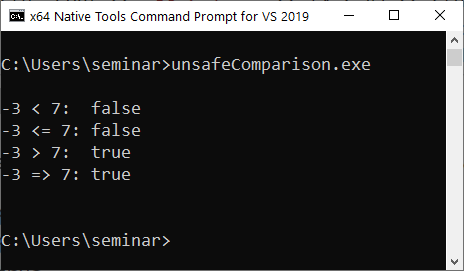
 Modernes C++ Mentoring
Modernes C++ Mentoring
Do you want to stay informed: Subscribe.
When you read the program output, you recognize -3 should be bigger than 7. You presumably know the reason. I compared a signed x (line (1)) with an unsigned y (line (2)). What is happening under the hood? The following program provides the answer.
// unsafeComparison2.cpp int main() { int x = -3; unsigned int y = 7; bool val = x < y; // (1) static_assert(static_cast<unsigned int>(-3) == 4'294'967'293); }
In the example, I’m focusing on the less-than-operator. C++ Insights gives me the following output:

Here is what’s happening:
- The compiler transforms the expression
x < y(line 1) intostatic_cast<unsigned int>(x) < y. In particular, thesignedxis converted to an unsigned int. - Due to the conversion,
-3becomes 4’294’967’293. 4'294'967'293is equal to (-3) modulo (2 to the power of 32).- 32 is the number of bits of an unsigned
inton C++ Insights.
Thanks to C++20, we have a safe comparison of integrals.
Safe Comparison of Integrals
C++20 supports the six comparison functions for integrals:
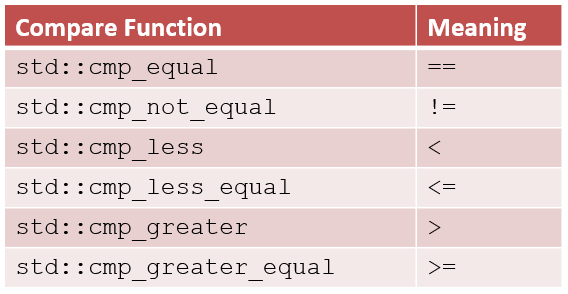
Thanks to the six comparison functions, I can easily transform the previous program unsafeComparison.cpp into the program safeComparison.cpp. The new comparison functions require the header <utility>.
// safeComparison.cpp #include <iostream> #include <utility> int main() { std::cout << std::endl; std::cout << std::boolalpha; int x = -3; unsigned int y = 7; std::cout << "3 == 7: " << std::cmp_equal(x, y) << std::endl; std::cout << "3 != 7: " << std::cmp_not_equal(x, y) << std::endl; std::cout << "-3 < 7: " << std::cmp_less(x, y) << std::endl; std::cout << "-3 <= 7: " << std::cmp_less_equal(x, y) << std::endl; std::cout << "-3 > 7: " << std::cmp_greater(x, y) << std::endl; std::cout << "-3 => 7: " << std::cmp_greater_equal(x, y) << std::endl; std::cout << std::endl; }
I also used in this program the equal and not equal operators.
Thanks to GCC 10, here is the expected result:
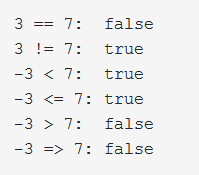
Invoking a comparison function with a non-integral value would cause a compile-time error.
// safeComparison2.cpp #include <iostream> #include <utility> int main() { double x = -3.5; // (1) unsigned int y = 7; // (2) std::cout << "-3.5 < 7: " << std::cmp_less(x, y) << std::endl; }
Trying to compare a double (line (1)) and an unsigned int (line (2)) gives the GCC 10 compiler a lengthy error message. Here is the crucial line of the error message:
 The internal type-traits __is_standard_integer failed. I was curious about what that means and looked it up in the GCC type-traits implementation on GitHub. Here are the relevant lines from the header
The internal type-traits __is_standard_integer failed. I was curious about what that means and looked it up in the GCC type-traits implementation on GitHub. Here are the relevant lines from the header type-traits:
// Check if a type is one of the signed or unsigned integer types. template<typename _Tp> using __is_standard_integer = __or_<__is_signed_integer<_Tp>, __is_unsigned_integer<_Tp>>; // Check if a type is one of the signed integer types. template<typename _Tp> using __is_signed_integer = __is_one_of<__remove_cv_t<_Tp>, signed char, signed short, signed int, signed long, signed long long // Check if a type is one of the unsigned integer types. template<typename _Tp> using __is_unsigned_integer = __is_one_of<__remove_cv_t<_Tp>, unsigned char, unsigned short, unsigned int, unsigned long, unsigned long long
__remove_cv_t is the internal function of GCC to remove const or volatile from a type.
Maybe, you are now curious about what happens when you compare a double and an unsigned int the classical way.
Here is the modified program safeComparison2.cpp.
// classicalComparison.cpp int main() { double x = -3.5; unsigned int y = 7; auto res = x < y; // true }
It works. The crucial unsigned int is floating-point promoted to double. C++ Insights shows the truth:
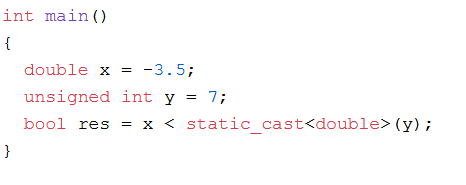
After so many comparisons, I want to end this post with our new mathematical constants with C++20.
Mathematical Constants
First, the constants require the header <numbers> and the namespace std::numbers. The following tables give you the first overview.
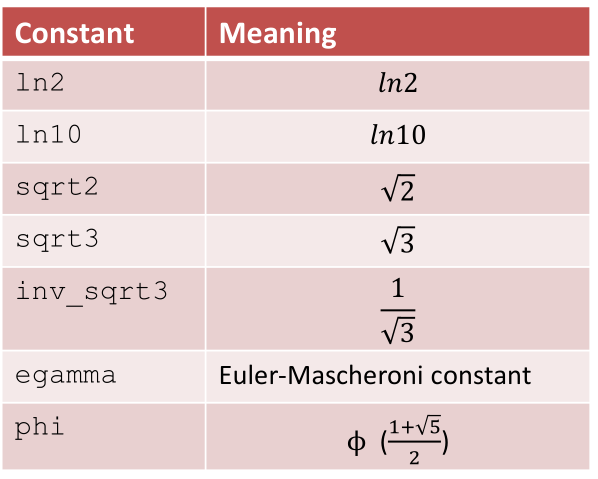
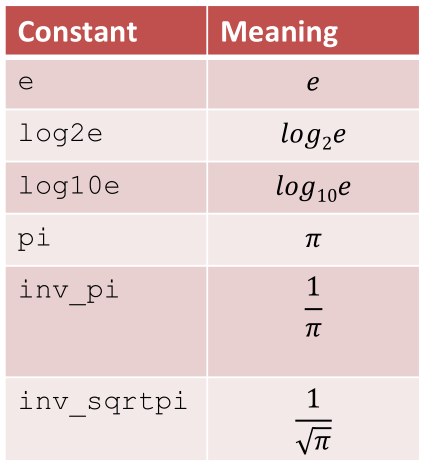
The program mathematicConstants.cpp applies the mathematical constants.
// mathematicConstants.cpp #include <iomanip> #include <iostream> #include <numbers> int main() { std::cout << std::endl; std::cout<< std::setprecision(10); std::cout << "std::numbers::e: " << std::numbers::e << std::endl; std::cout << "std::numbers::log2e: " << std::numbers::log2e << std::endl; std::cout << "std::numbers::log10e: " << std::numbers::log10e << std::endl; std::cout << "std::numbers::pi: " << std::numbers::pi << std::endl; std::cout << "std::numbers::inv_pi: " << std::numbers::inv_pi << std::endl; std::cout << "std::numbers::inv_sqrtpi: " << std::numbers::inv_sqrtpi << std::endl; std::cout << "std::numbers::ln2: " << std::numbers::ln2 << std::endl; std::cout << "std::numbers::sqrt2: " << std::numbers::sqrt2 << std::endl; std::cout << "std::numbers::sqrt3: " << std::numbers::sqrt3 << std::endl; std::cout << "std::numbers::inv_sqrt3: " << std::numbers::inv_sqrt3 << std::endl; std::cout << "std::numbers::egamma: " << std::numbers::egamma << std::endl; std::cout << "std::numbers::phi: " << std::numbers::phi << std::endl; std::cout << std::endl; }
Here is the output of the program with the MSVC compiler 19.27.
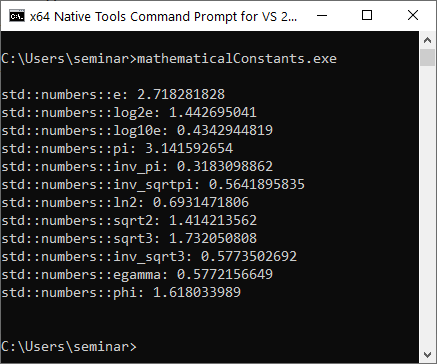
The mathematical constants are available for float, double, and long double. Per-default double is used, but you can also specify float (std::numbers::pi_v<float>) or long double (std::numbers::pi_v<long double>).
What’s next?
C++20 offers more valuable utilities. For example, you can ask your compiler which C++ feature it supports, and can easily create functional objects with std::bind_front, or perform different actions in a function whether the function runs a compile-time or at runtime.
Thanks a lot to my Patreon Supporters: Matt Braun, Roman Postanciuc, Tobias Zindl, G Prvulovic, Reinhold Dröge, Abernitzke, Frank Grimm, Sakib, Broeserl, António Pina, Sergey Agafyin, Андрей Бурмистров, Jake, GS, Lawton Shoemake, Jozo Leko, John Breland, Venkat Nandam, Jose Francisco, Douglas Tinkham, Kuchlong Kuchlong, Robert Blanch, Truels Wissneth, Mario Luoni, Friedrich Huber, lennonli, Pramod Tikare Muralidhara, Peter Ware, Daniel Hufschläger, Alessandro Pezzato, Bob Perry, Satish Vangipuram, Andi Ireland, Richard Ohnemus, Michael Dunsky, Leo Goodstadt, John Wiederhirn, Yacob Cohen-Arazi, Florian Tischler, Robin Furness, Michael Young, Holger Detering, Bernd Mühlhaus, Stephen Kelley, Kyle Dean, Tusar Palauri, Juan Dent, George Liao, Daniel Ceperley, Jon T Hess, Stephen Totten, Wolfgang Fütterer, Matthias Grün, Ben Atakora, Ann Shatoff, Rob North, Bhavith C Achar, Marco Parri Empoli, Philipp Lenk, Charles-Jianye Chen, Keith Jeffery, Matt Godbolt, Honey Sukesan, bruce_lee_wayne, Silviu Ardelean, schnapper79, Seeker, and Sundareswaran Senthilvel.
Thanks, in particular, to Jon Hess, Lakshman, Christian Wittenhorst, Sherhy Pyton, Dendi Suhubdy, Sudhakar Belagurusamy, Richard Sargeant, Rusty Fleming, John Nebel, Mipko, Alicja Kaminska, Slavko Radman, and David Poole.
| My special thanks to Embarcadero |  |
| My special thanks to PVS-Studio |  |
| My special thanks to Tipi.build |  |
| My special thanks to Take Up Code |  |
| My special thanks to SHAVEDYAKS |  |
Modernes C++ GmbH
Modernes C++ Mentoring (English)
Rainer Grimm
Yalovastraße 20
72108 Rottenburg
Mail: schulung@ModernesCpp.de
Mentoring: www.ModernesCpp.org


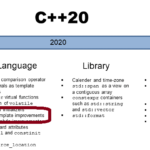
Leave a Reply
Want to join the discussion?Feel free to contribute!